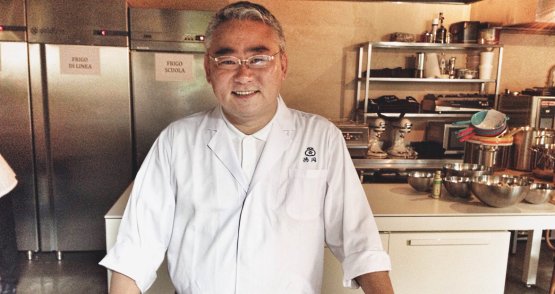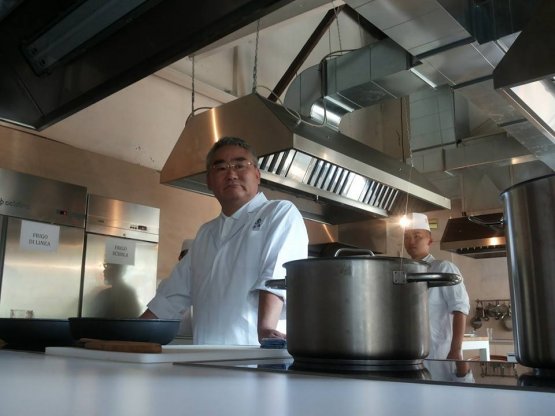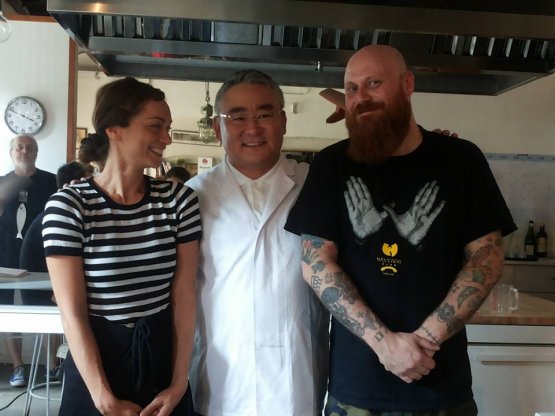
08-07-2015
The chef who’s envious of musicians
An interview with Kunio Tokuoka: chef at Arashiyama Kitcho, the most expensive restaurant in the world

Kunio Tokuoka started to study as a chef at 20, in 1980. His dream was to continue the process of modernisation of Japanese tradition his grandfather had begun, offering his clients an increasingly wide range of dishes
Working as a chef, for many, means seconding an inclination inherited in the family. This is certainly the case of Kunio Tokuoka, born in 1960, who followed the lesson of his grandfather, Teiichi Yuki, acknowledged as the creator of modern Kaiseki cuisine. The latter taught the art of cooking to his grandson until he became, in 1995, the executive chef of the most important restaurant in Kyoto, Arashiyama Kitcho, boasting three Michelin stars and considered the most expensive in the world.
On the occasion of Expo 2015, the Food Genius Academy invited Kunio Tokuoka to give a special lesson to the school’s best graduates. We used this occasion to approach the great Japanese chef and started by asking him about this fame of his. What does it mean, being the chef in the most expensive restaurant in the world? Are his skill and the deliciousness of his cooking also measured by the numbers written on the bill at the end of the dinner?
«I’d rather say that it is my clients who assess my skills, when they decide to come back to my restaurant. If they believe it’s too expensive, they will certainly not return. I can only say – laughs ironic and lively Tokuoka – that we’re always full, every night. Our tasting menu costs around 400€ and it is very, very rare to have guests coming alone, they are mostly couples who spend over 1000€ on average, including wine. It is certainly a lot, but in most cases guests return more than one time, so it clearly means they reckon the price is acceptable».
[[ ima2 ]]Today you’re in Italy, a country where Japanese cuisine is much beloved by the public and highly thought of by our chefs. What is your opinion of Italian cuisine, what elements do you find most interesting?
I believe the most interesting thing is the simplicity of Italian cooking. Attention though, when I say “simple”, I don’t mean it’s easy. I believe the greatness of Italian cuisine lies in its capacity of getting to the essence of flavours, and this is why I believe there are some connections with Japanese culinary cuisine.
How can you get this result, how do you get to the essence?
As chefs we need to pay attention so that flavours don’t overlap too much, so that the palate of those eating our dishes can perceive the goodness of raw materials. I don’t like it when the cooking is too complicated, using too many chemical processes to obtain spectacular or surprising results. When raw materials are excellent, our body will perceive it immediately. This is the lesson given by tradition and the history of cooking.
[[ ima3 ]]Cooking is part of your family’s heritage. Have you always thought that being a chef would be your destiny?
Yes, destiny is the correct word. It is so true that for some time, during my youth, I tried to fight this destiny. In fact I wanted to become a musician. My dream has always been to be a drummer. However, all my family was against it, so here I am.
What is the relationship between music and cooking, in your opinion?
Musicians are luckier than us. I have a dear friend who’s a famous singer and when I go to one of his concerts I realise that the response he gets from the public is extraordinary. Hearing ten or twenty thousand people roaring to welcome you must be incredible, this continuous exchange of energy between musician and public is something I envy those who live that life. So if you ask me if I’m happy to have chosen to become a chef...
Tokuoka now laughs and waves his hand in a very Italian gesture: «So-so», he says.

Kunio Tokuoka in the kitchen of Al Cortile (photo Food Genius Academy)

Tokuoka with Desirèe Nardone, director of the Food Genius Academy and Franco "Tucci" Ponti, manager of Al Cortile (photo credits Food Genius Academy)
Fuori Expo
Stories, tips and tastings from the city of the 2015 Universal Exposition
Journalist, based in Milan. At 8 years old, he received a Springsteen record as a gift, and nothing was the same since. Music and food are his passions. Author and broadcaster at Radio Popolare since 1997, since 2014 he became part of the staff of Identità Golose
Instagram: @NiccoloVecchia
Author's articles list